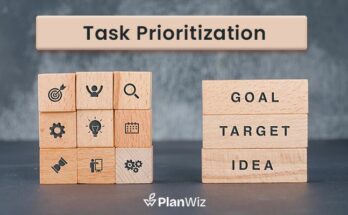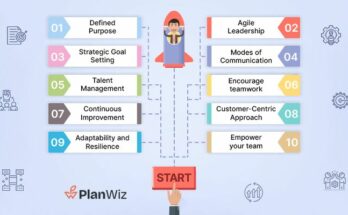Are you finding it challenging to create a daily schedule that genuinely reflects your goals and priorities? Fear not! This blog is here to offer you practical solutions on how to create a daily schedule that suits your needs. Let’s Explore and discuss strategies to help you optimize your time, boost productivity, and prioritize your overall well-being.
Incorporating a digital tool like a daily planner app can greatly enhance your scheduling process. With features designed to streamline your daily tasks and maximize productivity, a daily planner app can be a game-changer. Consider integrating one into your routine to experience the benefits firsthand.
Many individuals make their days look easy by following a personal schedule. By implementing 10 simple steps, you can wave goodbye to mess and welcome productivity into your life. Start today and witness the change for yourself!
Time Management: Striking the Balance Between Efficiency and Effectiveness
By understanding how to create a daily schedule and allocating specific time slots for tasks, individuals can enhance productivity and reduce procrastination. Assigning dedicated time slots fosters focused energy and attention, resulting in efficient task completion.
This approach facilitates prioritization based on importance and urgency, leading to a more organized workflow. Additionally, allocating specific time slots minimizes distractions, ensuring tasks are completed without being Unexecuted.
Embracing time-blocking Improves efficiency through focused and efficient task completion. Prioritizing tasks by importance and urgency transforms the schedule into a roadmap to success. By setting realistic deadlines and Harnessing productivity tools, individuals Defeat Avoidance while maintaining balance with regular breaks in their Daily Planner.
Prioritization: Key for Successful Task Management
Learning how to make a daily schedule involves organizing tasks by importance and deadlines. Prioritizing high-priority activities reduces stress and enhances productivity in managing time effectively. Efficient allocation of time and resources sets a productive tone for the day.
Effective prioritization in daily scheduling prevents task accumulation and maintains momentum. It fosters a sense of control and accomplishment, empowering focus on goals and ensuring optimal time management.
Excelling in daily scheduling involves organizing tasks by importance and deadlines, reducing stress, and optimizing performance. Resourceful allocation of time sets a productive tone, preventing task accumulation, and Keeping up the pace for optimal time management.

Organization: Structuring Your Day with a Schedule
Structuring your day with a schedule is essential for effective time management. Learning how to make a schedule for yourself ensures organization and prevents chaos in your routine. A well-organized schedule offers clarity, reducing decision fatigue and Improving efficiency.
By allocating specific time slots for tasks, you create a structured rhythm. This approach promotes better time management, allowing you to accomplish more in less time. With a clear outline of activities, individuals can stay focused and productive throughout the day.
Allocating dedicated time slots for tasks establishes a structured rhythm, facilitating better time management and increased productivity. With a clear outline of activities, individuals can maintain focus and productivity throughout the day, achieving more in less time.
Efficiency: Optimizing Tasks for Peak Performance

Identifying workflow inefficiencies is crucial for effective time management. A good schedule involves optimizing workflow to boost productivity. By automating or delegating tasks, you free up valuable time.
Efficiency is essential for achieving goals with minimal effort. A good schedule maximizes efficiency in accomplishing tasks effectively. Eliminating wasted time leads to greater satisfaction and success.
Recognizing where workflows fall short is key to managing time effectively. By automating or delegating tasks, you can free up valuable time and improve productivity. With a well-structured schedule that maximizes efficiency, you’ll find greater satisfaction and success in achieving your goals.
Goal Achievement: Success through Reaching Objectives
Breaking down larger goals into manageable tasks is a cornerstone of making a good schedule. By breaking goals into smaller, achievable tasks, progress can be made steadily.
Scheduling dedicated time to work on specific tasks is crucial for success. It helps maintain focus and momentum, leading to greater achievement.
Regularly reviewing and adjusting tasks ensures schedule alignment with goals. This adaptability fosters greater efficiency and productivity. By staying flexible, individuals can better manage tasks and achieve success.
Work-Life Balance: Harmony between Work and Life

Allocating time for various aspects of life is key to creating a daily schedule. Balancing work/study with personal activities and relaxation is crucial for overall well-being. This balance helps maintain physical and mental health, reducing stress.
Prioritizing self-care and leisure activities is essential for a daily schedule. Recharging and rejuvenating lead to increased energy and motivation. Achieving work-life balance fosters happiness and fulfillment, promoting a satisfying life.
Maintaining a balanced daily schedule involves allocating time for work, personal activities, and relaxation. Prioritizing self-care and leisure activities is crucial for overall well-being. Incorporating flexibility into the schedule allows for adaptability to unexpected events, reducing stress and promoting resilience. This balance fosters happiness and fulfillment, contributing to a satisfying life.
Adaptability: Flexibility in Responding to Change
Learning how to create a daily schedule involves the ability to adjust to unexpected events or changes in priorities while maintaining productivity, which is crucial for success. Flexibility allows individuals to adapt to changing circumstances or deadlines, preventing disruptions to workflow and progress.
By being adaptable, individuals can effectively manage stress and uncertainty, maintaining a sense of control and resilience. Adapting to changes in priorities allows for greater efficiency and effectiveness in achieving goals.
Flexibility in daily schedules allows for easy adjustment to unexpected events while maintaining productivity. Adjusting plans and prioritizing tasks enables individuals to navigate challenges effectively. This resilience cultivates empowerment, fostering success with confidence.
Accountability: Ownership of Time and Tasks
Creating a good schedule involves holding yourself accountable for your time and tasks. By mapping out your day and allocating specific time slots, you establish a framework for accountability.
This accountability fosters discipline and commitment, encouraging focus and motivation. Following your schedule consistently builds trust in your time management skills.
Creating a good planner means taking responsibility for your time and tasks. Planning your day and sticking to specific time slots help you stay on track. This builds discipline and commitment, boosting your focus and motivation. Consistently following your schedule builds confidence in your time management skills.
Stress Reduction: Effective Stress Management Strategies

Knowing how to create a daily schedule can alleviate stress and anxiety. By having a plan in place and prioritizing tasks, you gain clarity and confidence in managing your time effectively. This structured approach reduces feelings of Conquer and uncertainty.
Additionally, scheduling regular breaks and incorporating relaxation techniques promotes mental well-being. Incorporating these practices into your routine can alleviate stress and maintain overall well-being.
Integrating these practices into your daily schedule not only helps alleviate stress but also maintains your overall well-being. By prioritizing self-care and incorporating relaxation, you can effectively manage stress and lead a more balanced and fulfilling life.
Self-Improvement: Personal Skills and Abilities
Continuously refining and adjusting your schedule is vital for mastering how to make a good schedule. By regularly reviewing your progress and pinpointing areas for enhancement, you can make informed tweaks to your schedule.
This iterative process of self-improvement fosters the development of effective time management habits. It enables you to refine your strategies and techniques, ultimately Increasing productivity and achieving success.
Consistently revisiting and refining your schedule is crucial for optimizing your time management skills. Identifying areas for improvement and making informed adjustments foster the development of effective habits, resulting in increased productivity and eventual success.
Also Read:
Final Thoughts:
Designing your daily schedule might appear as just another task to check off your list. However, this simple act of life organization holds immense power. It serves as your compass, guiding you through the day with less stress, better time management, and the precious gift of freedom to indulge in activities you truly appreciate.




